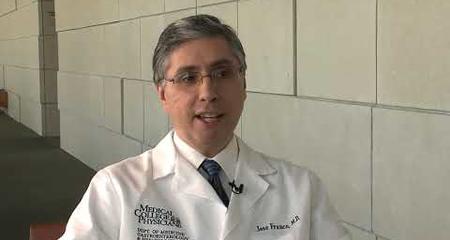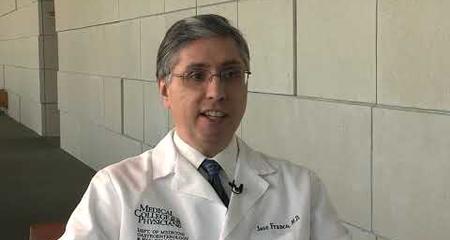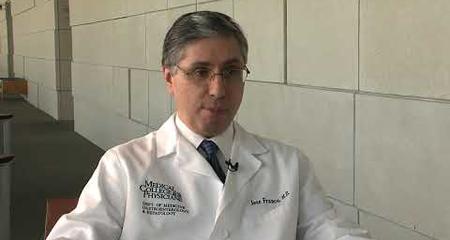Leading-Edge Research
Medical College of Wisconsin physician-scientists have earned national and international recognition for significant research into the causes and treatment of digestive diseases and disorders. Researchers conduct locally based research as well as participate in studies on a national and international basis.
Examples of clinical research trials include:
- The development of a new form of endoscopy called transnasal ultra-thin unsedated upper endoscopy to view the esophagus and stomach to screen people at risk for esophageal cancer. The ultra-thin procedure does not require sedation and can be performed in less than 20 minutes. It was developed and validated by researchers and clinicians at the Medical College of Wisconsin.
- The research division of the Dysphagia Institute, supported by grant funds from the National Institutes of Health and other federal funding agencies, has achieved international recognition for research in swallowing disorders, such as:
- Researching the genetics of reflux disease; two genes have been identified in people who develop esophagus inflammation caused by gastroesophageal reflux disease (GERD)
- Developing new devices to more precisely diagnose dysphagia symptoms that an ordinary exam can’t reveal
- New techniques and treatments are continuously under investigation for pancreaticobiliary diseases. Patients have the opportunity to participate in national and international clinical research trials covering all aspects of liver disease, especially studies for hepatitis B and hepatitis C.
Inflammatory Bowel Disease (IBD)
Care of patients with IBD is intertwined with continuous research. Information gathered from each patient’s experience with IBD is used to influence and improve future medical treatments for all IBD patients. By focusing solely on treating people with IBD and gathering data, treatments are optimized for all patients.
To accomplish this, each time patients visit the program, they complete forms to indicate their current health status and quality of life. This subjective and objective health information is collected, analyzed, validated and used as the basis for tailoring treatment for current as well as future patients. Data collected from patients at Froedtert & the Medical College of Wisconsin influences the treatment of IBD all over the country.
Other research in IBD and IBS includes:
- Researchers are studying cellular and molecular mechanisms involved in inflammatory bowel disease (IBD), as well as evaluating new forms of therapy for IBD patients.
- Functional MRI (fMRI) is being used to study brain activity in women who have irritable bowel syndrome (IBS) compared to women who do not have IBS. Women who have IBS appear to have nerves in the brain that pick up signals they shouldn’t pick up.
Dua Anti-Reflux Valve
Esophageal cancer often develops where the esophagus meets the stomach. In the past few years, stents (small tubes) have been developed that can be placed in the esophagus, bypassing a tumor and allowing patients to eat.
Although the stent enables food to go down, it also allows stomach contents to come up (reflux) into the esophagus and mouth. The reflux is dangerous due to the threat of suffocation (especially when lying flat) and the threat of pneumonia.
To preserve patients’ quality of life while reducing such risks, Kulwinder Dua, MD, designed a pressure-sensitive valve that allows patients to eat and drink while blocking reflux. The “Dua Stent” features a soft valve extending from its lower end like a windsock.
The valve closes when stomach pressure increases, preventing reflux. Cleared for use in 2002 by the U.S. Food and Drug Administration, the innovative stent enhances the quality of life for people worldwide. The valve in the stent allows patients to enjoy eating without the problems of reflux. The valve also allows patients to belch or vomit if necessary.
Using the same principle, the valve is being studied to reduce clogging in bile duct stents for patients with tumors that obstruct the bile duct. This clinical study is using the anti-reflux biliary stent in patients with cancer of the pancreas or bile duct.
Teaching the Next Generation
As an academic medical center, Froedtert & the Medical College of Wisconsin have a longstanding commitment to teaching the next generation of healthcare professionals. The Gastroenterology Fellowship Program at the Medical College of Wisconsin has a proud history of training more than 130 physicians who have gone on to distinguish themselves in academic gastroenterology and clinical practice throughout the United States and the world.
The three-year fellowship program offers comprehensive training in the field of gastroenterology and hepatology, providing physicians with the required experience to become well-rounded gastroenterologists.
Recognized as High Performing by U.S. News & World Report
Froedtert Hospital is recognized by U.S. News & World Report as high performing in three adult specialties and 16 procedures and conditions, including gastroenterology and GI surgery.Virtual Visits Are Available
Safe and convenient virtual visits by video let you get the care you need via a mobile device, tablet or computer wherever you are. We'll assess your condition and develop a treatment plan right away. To schedule a virtual visit, call 414-777-7700.





